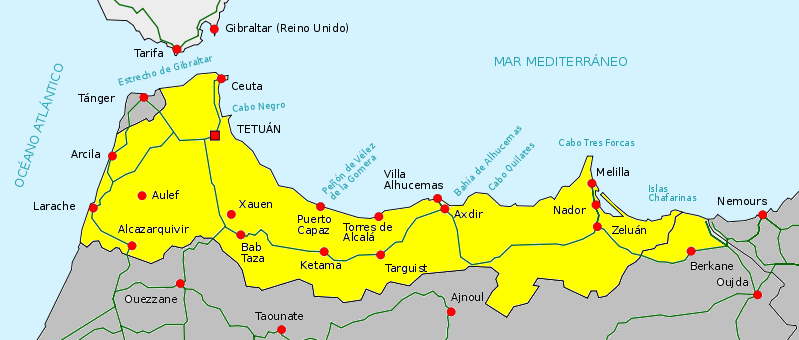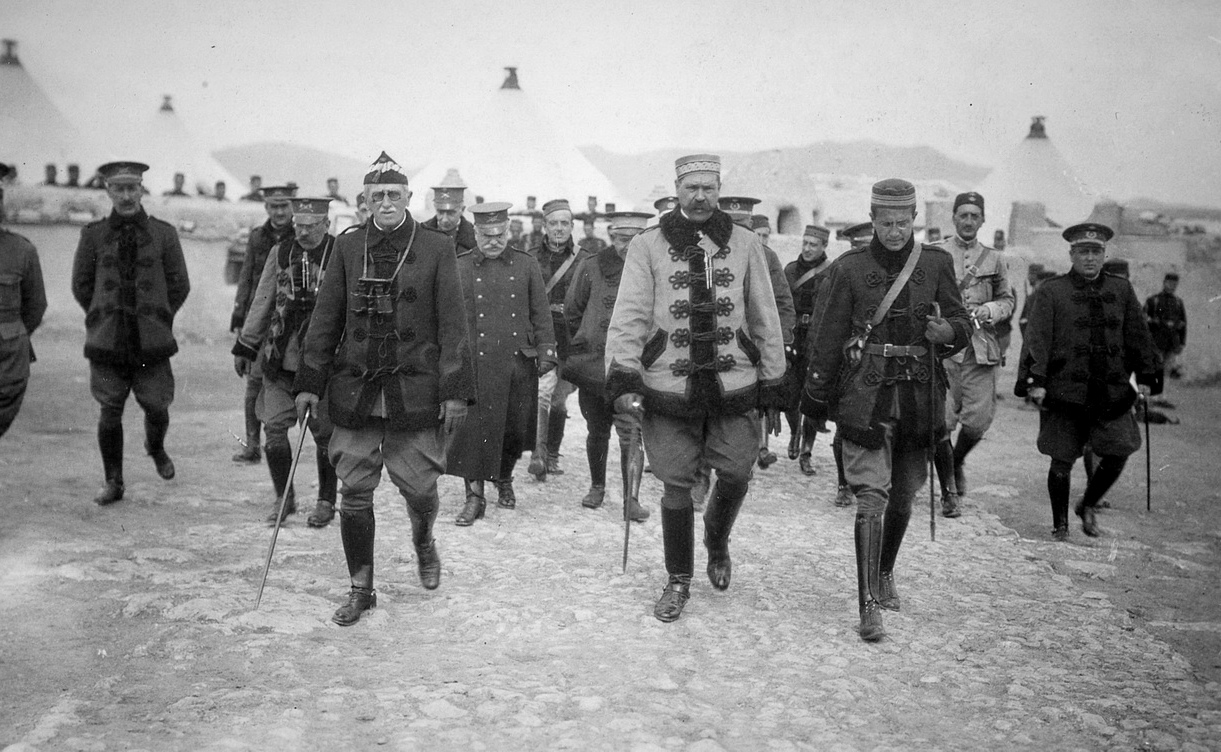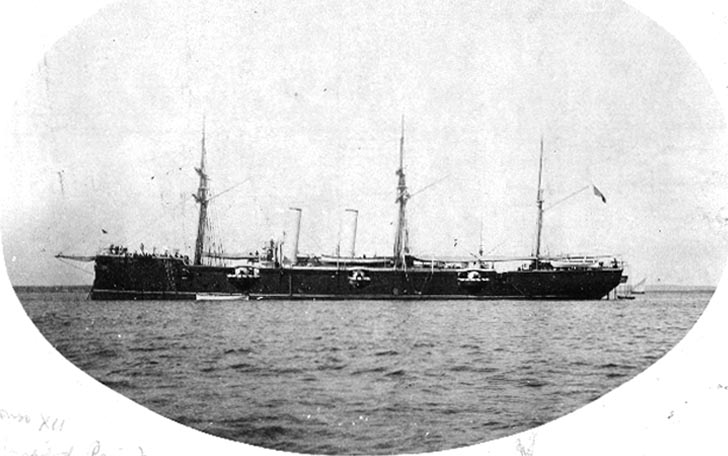|
Miguel Primo De Rivera
Miguel Primo de Rivera y Orbaneja, 2nd Marquis of Estella, Grandee, GE (8 January 1870 – 16 March 1930), was a Spanish dictator and military officer who ruled as prime minister of Spain from 1923 to 1930 during the last years of the Restoration (Spain), Bourbon Restoration. He was born into a landowning family of Andalusian Aristocracy (class), aristocrats. He met his baptism by fire in October 1893 in Cabrerizas Altas during the so-called Margallo War. He moved up the military ladder, promoted to brigadier general (1911), division general (1914), and lieutenant general (1919). He went on to serve as administrator of the Valencia, Madrid, and Barcelona military regions, distinguishing himself as a voice in favour of military withdrawal from Africa. During the crisis of the Restoration regime, specifically upon political turmoil in the wake of setbacks in the Rif War and the ensuing spillover of the enquiries of the Picasso file, Primo de Rivera staged 1923 Spanish coup d' ... [...More Info...] [...Related Items...] OR: [Wikipedia] [Google] [Baidu] |
Prime Minister Of Spain
The prime minister of Spain, officially president of the Government (), is the head of government of Spain. The prime minister nominates the Spanish government departments, ministers and chairs the Council of Ministers (Spain), Council of Ministers. In this sense, the prime minister establishes the Government of Spain, Government policies and coordinates the actions of the Cabinet members. As chief executive, the prime minister also advises the Monarchy of Spain, monarch on the exercise of their royal prerogatives. Although it is not possible to determine when the position actually originated, the office of prime minister evolved throughout history to what it is today. The role of prime minister (then called Secretary of State) as president of the Council of Ministers, first appears in a royal decree of 1824 by King Ferdinand VII of Spain, Ferdinand VII. The current office was established during the reign of Juan Carlos I, in the Constitution of Spain, 1978 Constitution, which ... [...More Info...] [...Related Items...] OR: [Wikipedia] [Google] [Baidu] |
List Of Foreign Ministers Of Spain
The following is a list of foreign ministers of Spain, since 1808 until now serving in Spain's Ministry of Foreign Affairs. Kingdom of Spain (1808–73) Ministers of State (1820–23/1834–73) and Secretaries of the Office of State (1808–20/1823–34) Political Persuasion: First Spanish Republic (1873–74) Ministers of State Political Persuasion: Kingdom of Spain (1874–1931) Ministers of State (1874–1928) Political Persuasion: President and Minister of Foreign Affairs (1928–30) Political Persuasion: Ministers of State (1930–31) Political Persuasion: Second Spanish Republic (1931–39) Ministers of State Political Persuasion: Francoist Spain (1939–75) Ministers of Foreign Affairs Political Persuasion: Kingdom of Spain (1975-2004) Ministers of Foreign Affairs (1975–2004) Political Persuasion: Ministers of Foreign Affairs and Cooperation (2004–2018) Political Persuasion: Ministers of Forei ... [...More Info...] [...Related Items...] OR: [Wikipedia] [Google] [Baidu] |
DR K
DR K was a Danish free-to-air Free-to-air (FTA) services are television (TV) and radio services broadcast in unencrypted form, allowing any person with the appropriate receiving equipment to receive the signal and view or listen to the content without requiring a subscri ... television channel owned by state broadcaster DR. Its programming was centred towards culture and history. History Originally conceived as a channel dedicated to history, the channel was first presented in 2005 in the run up to DR's new settlement with the Danish state. It would draw on DR's vast archives of Danish material. The effort would be combined with digitalising DR's archives and launching interactive services. There would also be special channels for children, the youth and drama. When the media settlement was presented in June 2006, the plans were to launch a combined channel with children's programmes in the daytime and history programmes in the evening. The names of the new digital terr ... [...More Info...] [...Related Items...] OR: [Wikipedia] [Google] [Baidu] |
Africanist (Spain)
Africanists () were the people who encouraged a strong colonial involvement of Spain in Africa, particularly in the early 20th century. Although Spain had been present in African territory for numerous centuries, it was not until the arrival of New Imperialism and the Berlin Conference in 1884 that the colonial power set its interests in African soil. Africanism emerged mainly from the loss of Cuba, the Philippines, Puerto Rico, Guam, and various other islands in 1898 as a consequence of the Spanish–American War. Africanists sought to compensate for these losses by consolidating their possessions in Africa. Spain's colonizing Africa was smaller when compared to other European colonizers, even after losing their colonies in the Americas and Pacific, because there was a lack of public support to re-establish themselves as an empire. Spain's economy recovered quickly after the loss of their colonies during the Spanish-American War, and the general population lost their fervor for main ... [...More Info...] [...Related Items...] OR: [Wikipedia] [Google] [Baidu] |
1923 Spanish Coup D'état
The coup d'état of Primo de Rivera took place in Spain between 13 and 15 September 1923 and was led by the then Captain General of Catalonia Miguel Primo de Rivera. It resulted in the establishment of the dictatorship of Primo de Rivera, mainly because King Alfonso XIII did not oppose the coup and appointed the rebel general as head of the Government at the head of a Militar Directory of Primo de Rivera, Militar Directory. Historian Francisco Alía Miranda has pointed out that "the coup d'état of General Miguel Primo de Rivera [was] atypical for its simplicity. To triumph he only needed the backing of a few prestigious military officers and to publish a manifesto in the press addressed ''To the country and the Army''. The Restoration (Spain), Restoration regime collapsed in a few hours. [...] He did not need more backing from chiefs in command of the troops, for that the shadow of Alfonso XIII was already behind him". Javier Moreno Luzón pointed out that Alfonso XIII "knew th ... [...More Info...] [...Related Items...] OR: [Wikipedia] [Google] [Baidu] |
Picasso File
The Picasso File (in Spanish: ''Expediente Picasso'') is the name given to the report written by General Juan Picasso González, assigned to the Supreme Council of War and Navy, the highest body of military jurisdiction, in relation to the events that took place in the General Command of Melilla in the months of July and August 1921, known as the " Annual Disaster". The following year, General Picasso presented his conclusions to the Supreme Council of War and Navy in a four hundred page summary. The government presided by the conservative José Sánchez Guerra then decided to take the Picasso File to the Congress of Deputies, where a first Commission of Responsibilities was formed in July 1922. It presented its verdict (actually there were three) to the Cortes in November, starting an intense debate. In fact, during that time the File became the most important political problem in the country. In July 1923 a second Commission of Responsibilities was formed but it could not issu ... [...More Info...] [...Related Items...] OR: [Wikipedia] [Google] [Baidu] |
Rif War
The Rif War (, , ) was an armed conflict fought from 1921 to 1926 between Spain (joined by France in 1924) and the Berber tribes of the mountainous Rif region of northern Morocco. Led by Abd el-Krim, the Riffians at first inflicted several defeats on the Spanish forces by using guerrilla tactics and with the help of captured European weapons. After France's military intervention against Abd el-Krim's forces and the major landing of Spanish troops at Al Hoceima, considered the first amphibious landing in history to involve the use of tanks and aircraft, Abd el-Krim surrendered to the French and was taken into exile. In July 1909, Spanish workers constructing a rail-bridge providing access to iron mines near Melilla were attacked by Riffian tribesmen. This incident led to the summoning of reinforcements from Spain itself. A series of skirmishes over the following weeks cost the Spanish over a thousand casualties. By September, the Spanish Army had 40,000 troops in northern ... [...More Info...] [...Related Items...] OR: [Wikipedia] [Google] [Baidu] |
Margallo War
The First Melillan Campaign, also called the Melilla War or the Margallo War (after Juan García y Margallo, the Spanish governor of Melilla whose defeat and death infuriated the Spanish public) in Spain, was a conflict between Spain and the Riffian tribes of northeastern Morocco, and later the Sultan of Morocco, that began in October 1893, was openly declared November 9, 1893, and was resolved by the Treaty of Fez in 1894. Historical situation The Crown of Castile captured the citadel of Melilla in 1497. In the 19th century Spain moved into the outlying territories and began investing in their economic development. Treaties with Morocco in 1859, 1860, and 1861 consolidated Spain's growing interests. Although Spain enjoyed the compliance of the Moroccan government, tensions flared between Spanish Army patrols and the local Riffian tribes that were hostile to Spain, and over whom the Sultan had practically no control. Riffian raiding and piracy was widely reported in the S ... [...More Info...] [...Related Items...] OR: [Wikipedia] [Google] [Baidu] |
Baptism By Fire
The phrase baptism by fire, baptism of fire or baptism with fire is a Christian theological concept originating from the words of John the Baptist in Matthew 3:11. It also has related meanings in military history and popular culture. Christianity The term ''baptism with fire'' originated from the words of John the Baptist in Matthew 3:11 (and the parallel passage in Luke 3:16).: Many Christian writers, such as John Kitto, have noted that this could be taken as a hendiadys, the Spirit as fire, or as pointing out two distinct baptisms - one by the Spirit, one by fire. If two baptisms, then various meanings have been suggested for the second baptism, by fire - to purify each single individual who accept Jesus Christ as Lord and Savior to be the temple of the Holy Spirit, to cast out demons and to destroy the stronghold of the flesh by the Fire of God. Of this expression, J. H. Thayer commented: "to overwhelm with fire (those who do not repent), i.e., to subject them to the te ... [...More Info...] [...Related Items...] OR: [Wikipedia] [Google] [Baidu] |
Aristocracy (class)
The aristocracy (''from Greek'' ''ἀριστοκρατία'' ''aristokratía'', "rule of the best"; ''Latin: aristocratia'') is historically associated with a "hereditary" or a "ruling" social class. In many states, the aristocracy included the upper class with hereditary rank and titles. They are usually below only the monarch of a country or nation in its social hierarchy. History In some, such as ancient Greece, ancient Rome, or India, aristocratic status came from belonging to a military class. It has also been common, notably in African and Oriental societies, for aristocrats to belong to priestly dynasties. Aristocratic status can involve feudal or legal privileges. Plato’s '' Symposium'' offers a glimpse into the intellectual and cultural life of aristocracy in ancient Athens. The dialogue takes place at a banquet attended by prominent Athenian aristocrats, illustrating how the elite not only wielded political and military power but also shaped philosophic ... [...More Info...] [...Related Items...] OR: [Wikipedia] [Google] [Baidu] |
Restoration (Spain)
The Restoration () or Bourbon Restoration () was the period in Spanish history between the First Spanish Republic and the Second Spanish Republic from 1874 to 1931. It began on 29 December 1874, after a coup d'état by General Arsenio Martínez Campos ended the First Spanish Republic and restored the monarchy under Alfonso XII, and ended on 14 April 1931 with the proclamation of the Second Spanish Republic. After nearly a century of political instability and several civil wars, the Restoration attempted to establish a new political system that ensured stability through the practice of '' turno'', an intentional rotation of liberal and conservative parties in leadership often achieved through electoral fraud. Critics of the system included republicans, socialists, anarchists, Basque and Catalan nationalists, and Carlists. Characteristics The Restoration period was characterized by political instability, economic challenges, and social unrest. Key issues that defined t ... [...More Info...] [...Related Items...] OR: [Wikipedia] [Google] [Baidu] |
Prime Minister Of Spain
The prime minister of Spain, officially president of the Government (), is the head of government of Spain. The prime minister nominates the Spanish government departments, ministers and chairs the Council of Ministers (Spain), Council of Ministers. In this sense, the prime minister establishes the Government of Spain, Government policies and coordinates the actions of the Cabinet members. As chief executive, the prime minister also advises the Monarchy of Spain, monarch on the exercise of their royal prerogatives. Although it is not possible to determine when the position actually originated, the office of prime minister evolved throughout history to what it is today. The role of prime minister (then called Secretary of State) as president of the Council of Ministers, first appears in a royal decree of 1824 by King Ferdinand VII of Spain, Ferdinand VII. The current office was established during the reign of Juan Carlos I, in the Constitution of Spain, 1978 Constitution, which ... [...More Info...] [...Related Items...] OR: [Wikipedia] [Google] [Baidu] |







